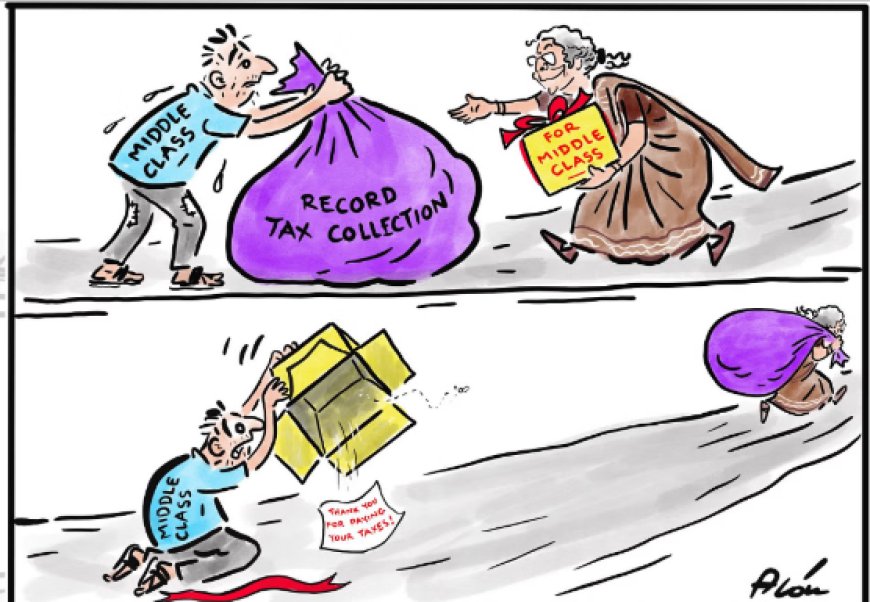India’s Popcorn Tax: A Crunchy Controversy or Just Another GST Misstep?
India's new GST on popcorn, ranging from 5% to 18%, has sparked widespread criticism and humor. Critics argue it adds unnecessary complexity to an already convoluted tax system. Many see it as an example of government overreach, questioning why a simple snack should be taxed. The move has triggered a public outcry, highlighting the need for tax simplification in India.

In a move that has sparked both ridicule and serious debate, India’s Finance Minister, Nirmala Sitharaman, recently introduced a tax on popcorn. Yes, you read that right—popcorn, the humble snack that has long been a cinema staple and an indulgence during family movie nights, is now part of the Goods and Services Tax (GST) system.
Under the newly announced tiered GST structure, non-branded salted popcorn will be taxed at 5%, branded and pre-packaged popcorn will be taxed at 12%, and caramel popcorn, being a sugar confectionery, will fall under an 18% tax rate. The government’s explanation? Well, that remains a mystery to most, as the move has raised more questions than answers.
The Great Popcorn Tax Debate

India’s tax system, which has been under scrutiny for years, continues to be a point of contention. The introduction of the popcorn tax is being seen by many as a step too far, especially when you consider that a snack, which costs just a few rupees in most places, will now be subjected to a whole new layer of bureaucracy.
Memes and satirical articles about the popcorn tax have flooded social media. In one viral post, Finance Minister Sitharaman was humorously pictured holding bags of popcorn, with a caption that read: “Even popcorn reaches the 18% GST slab. Next, they’ll tax air and sunlight!” The humor highlights the absurdity many feel about the government’s increasing tendency to micromanage and tax even the simplest pleasures.
Criticism of the GST System
Popcorn is hardly the only item to find itself caught up in the ever-complicated GST system. In the past, India has witnessed debates over taxing items like chapatis versus parathas, or curd versus yogurt—matters that would seem too trivial for tax authorities but have nonetheless created confusion.
Economists and critics are raising concerns about the level of complexity this tiered taxation system brings. Former Chief Economic Advisor, K.V. Subramanian, and economist Arvind Subramanian have both expressed doubts about the logic of such classifications. While the government claims the system is designed to make taxation more transparent, critics argue that it is actually doing the opposite by creating further confusion. The popcorn tax, they argue, is a perfect example of the convoluted bureaucracy that continues to plague the system.
The Irony of Over-Regulation
Perhaps the most ironic aspect of the popcorn tax is that it underscores a deeper issue with India’s regulatory approach. Popcorn, a snack that has been around for centuries, was never intended to be a luxury good or an item requiring governmental oversight. Yet, in India, almost everything is now subject to layers of taxation and regulation. The idea that a government could regulate something as innocuous as popcorn feels almost symbolic of the larger issue of excessive governmental control.
For many libertarians and critics of the state, the popcorn tax is yet another example of how excessive government regulation interferes with individual freedoms. As India continues to struggle with its complex tax system, citizens are becoming more vocal about their dissatisfaction with being taxed for every small transaction. The popcorn tax is simply the latest in a series of policies that make citizens feel like they are constantly under surveillance or controlled by an ever-growing bureaucracy.
The Road Ahead: Can the Government Pop This Tax Balloon?
The uproar surrounding the popcorn tax is unlikely to die down anytime soon. As of now, there has been no official explanation from the GST Council as to why popcorn was singled out for this particular tiered tax structure. Could it be that this is just another step in the ongoing evolution of India’s tax framework, or is it a case of overreach?
In the future, the government might find itself facing even more pressure to revisit its policies. As the public continues to voice its discontent, the popcorn tax could end up being a defining moment in the ongoing saga of India’s GST. Whether or not it will be reversed, or remain a quirky historical footnote, remains to be seen.
The Final Verdict: A Popcorn Tax Too Far?

For now, it seems that the popcorn tax has done what many policies fail to do: it has captured the imagination of the public. While the government continues to defend its approach, citizens seem to agree on one thing: the popcorn tax is a step too far. With so many pressing issues in the country, taxing a simple snack like popcorn might not be the kind of regulation the country needs.
It’s a lesson in how not to govern—a reminder that while taxes are necessary, sometimes less is more. And as we await further developments, one thing is clear: in India, even popcorn isn’t safe from the long arm of taxation.
What's Your Reaction?



















































